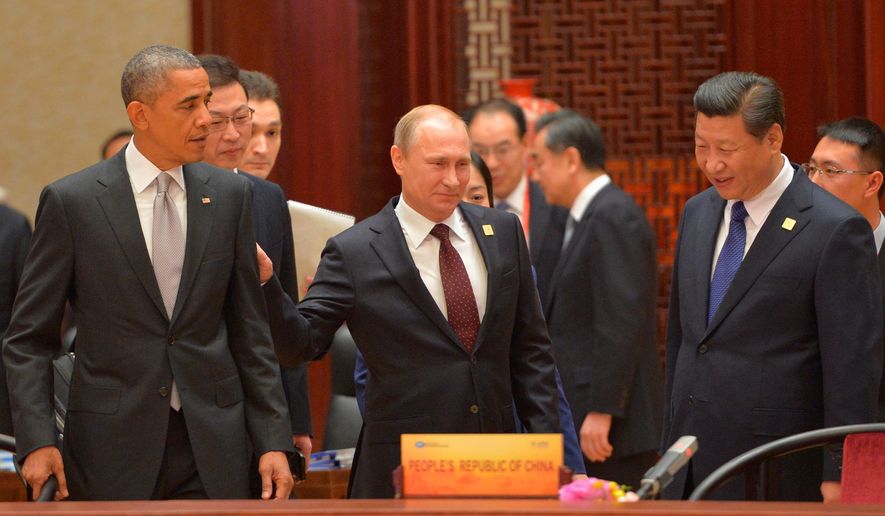OPINION:
Recently, at the Asia Pacific Economic Cooperation (APEC) summit in Beijing, dignitaries from around the world gathered to promote greater economic cooperation. At APEC, the United States and China finalized a new deal that would limit greenhouse gas emissions. President Obama hailed the agreement as a “milestone in the U.S.-China relationship”.
But is this the flowering of a renewed relationship?
The climate deal itself places China at an advantage. The U.S. has agreed to double the pace of its carbon-dioxide reductions after 2020 and set new targets for reducing overall greenhouse gas emissions by 26% to 28% by 2025. However, China did not commit to cut emissions by any specific amount, giving merely a vague promise to set a peak in emissions by 2030. China will also continue to build new coal plants and grow emissions.
While President Obama is touting his success and using it to promote a climate change agenda at the G20 summit, the deal that everyone should be paying attention to is the energy deal between Russia and China. The preliminary deal is the second large energy deal between the two nations this year. Russia’s state owned oil firm OAO Gazprom will supply China with as much as 30 billion cubic meters of gas annually, for the next 30 years. Additionally, the China National Petroleum Corp. will purchase a 10% stake in the Siberian unit of Russia’s oil producer OAO Rosneft.
While this deal is minor in comparison to total global consumption, the 30 billion cubic meters per year is on top of a 38 billion cubic meters per year deal already signed, with more potential deals in the future. The biggest headline of this deal is how China will be paying for it. In a deliberate shunning of the dollar, Russia will be receiving renminbi as payment for the oil.
Currently, the U.S. dollar holds the status of the world’s reserve currency. As the world’s reserve currency, the majority of global trading is in U.S. dollars. Because nearly everybody uses the dollar, this creates a tremendous demand around the world and gives the U.S. government an advantage in international borrowing.
Upset at the built-in advantages America gains by being the world’s reserve currency and lone super power, China and Russia have been looking to diminish the dollars international status and America’s role in the world, for years. Last year, China’s official Xinhua News Agency called for a “de-Americanized world” by establishing a new international reserve currency to replace the dollar.
Over the past several years, both countries have been seeking to chip away at that the dollars status. Last year China worked out a major currency swap agreement with the eurozone moving the Yuan closer to global currency status.
Russia and China have engaged in currency swap agreements, between themselves, to bypass the dollar in bilateral payments and both countries’ central banks have been stockpiling large gold reserves.
The massive accumulation of gold is a way to hedge against a potential currency crisis and legitimate their domestic currency with a gold reserve. For the past few months, Russia has engaged in a massive gold buying spree, both to help offset the effects of western sanctions and to hasten their independence from western financial systems.
The only thing to come out of the APEC summit is a weaker America. While President Obama expresses excitement over the agreement with China, it is a hollow victory. The agreement provides many substantive promises by the U.S. in return for vague promises on behalf of China. The agreement will result in more EPA regulations on coal, ensure higher energy rates to U.S. consumers, and hurt middle class families.
Russia and China are pushing the U.S. into a currency crisis. The massive national debt accumulated through massive U.S. borrowing is unsustainable. The growing interest on our debt will soon consume the majority of our federal budget. With the international community relying less and less on the dollar, eliminating our reserve currency status will result in higher interest rates, a rise in prices, and a greater difficulty servicing our debt.
President Obama has failed to treat China and Russia as the dangerous global competitors that we know them to be. These countries are actively attempting to diminish our standing in the world. We should not work out agreements with these countries without keeping this in mind, nor should we rely on vague promises, which can be easily broken.
Alex VanNess is the Manager of Public Information for the Center for Security Policy and a former staffer on Capitol Hill.




Please read our comment policy before commenting.